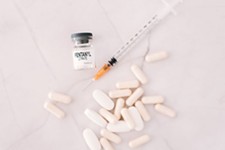The State of Monkeypox in Austin
Case numbers are low, but so is vaccine supply
By Lina Fisher, Fri., Aug. 12, 2022

On the heels of President Joe Biden's Aug. 4 declaration of monkeypox as a public health emergency, Austin Public Health and Central Health hosted their first official town hall on the disease Friday, Aug. 5. Austin Mayor Steve Adler and Travis County Judge Andy Brown subsequently declared it a public health emergency Tuesday, Aug. 9, and City Council is considering declaring a local disaster at today's meeting. For now, resources are low, but local officials hope the declaration will help garner more vaccines and emergency funds.
Travis County has seen 9 confirmed and 59 presumptive cases of monkeypox as of press time. There are 702 confirmed cases in Texas as a whole (mostly in Dallas); of those, 9 are women and 2 are children.
Although monkeypox can present like COVID-19 initially – fever, body aches, fatigue – it is harder to spread and less severe. Monkeypox has also been compared to HIV, as 98% of cases are among men who have sex with men, but officials stress that it is not an STI, and the disease could spread to anyone. Unlike both COVID and HIV, monkeypox is "self-limited," meaning 99% of people recover without treatment or hospitalization.
As for testing, APH currently has no communitywide initiative similar to COVID testing sites planned. APH advises symptomatic people to call their health care provider or APH's health equity line. "Because of the areas that need to be swabbed [the sore itself], it's a little more nuanced, and not as easy as setting up a station to swab your nose," Health Authority Dr. Desmar Walkes said. Complicating things further, results must be sent to the U.S. Centers for Disease Control for confirmation.
The area's vaccine supply is also low. APH asked for 5,000 doses from the Texas Department of State Health Services but only received 3,000. Because the city aims to give recipients two doses 28 days apart, this batch will only serve 1,500 patients. The two-dose approach and the city's chosen priority groups differ from other cities fighting the spread. San Francisco and Los Angeles prioritize giving the first dose to as many people as possible, waiting on second doses until supplies exist. For eligibility, APH's priority is people who have been exposed to a known case in the last 14 days, then those who have had multiple sex partners in places with monkeypox. APH says it has to follow the state and CDC guidelines, but cities including San Francisco, Los Angeles, and New York are prioritizing vaccinating queer people "who have sex with men, who have had more than 1 sexual partner in the past 14 days," regardless of known exposure to the virus.
Frustrations on the ground are swelling. Jeremy Stilb, marketing manager at sexual health clinic ASHwell, says many in Austin's LGBTQ+ community are confused about vaccine eligibility, and about why cities including Dallas received more doses. "What should be happening," says Stilb, "is that people that are self-identifying as being at risk, which is men that sleep with men and have multiple partners, they should be the ones prioritized for the vaccine." Stilb says the lag time between ruling out other diseases and receiving treatment is also frustrating to people whose painful symptoms worsen in the interim, and that some would like to receive TPOXX, aka tecovirimat, a possible treatment that the FDA has yet to approve for monkeypox.
"A lot of the people in these decision-making positions – these are abstract issues to them. And for someone like me, it's like, I feel at risk, my friends are at risk. This is a very palpable fear." Stilb says, right now, "I don't like preaching abstinence, but unfortunately, I think that's what's going to work until there's more access to vaccines." Vivent Health's Dr. Aliza Norwood agreed: "I think this is just going to be another conversation [with] sexual partners who you may not know about, kind of like we've had to do dating with COVID."
Read our brief FAQ about monkeypox in Austin-Travis County here.
Got something to say? The Chronicle welcomes opinion pieces on any topic from the community. Submit yours now at austinchronicle.com/opinion.






